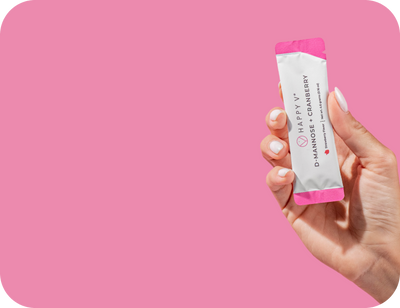- Fact Checked
- September 05, 2025
- 13 min read
Natural Remedies & Treatments for Ovarian Cysts
Table of Contents
Table of Contents
Hearing the words “ovarian cyst” can feel unsettling, but the reality is that cysts are a common part of many women’s reproductive health journey. In fact, most cysts are harmless, symptom-free, and even resolve on their own without treatment. Still, when pain, bloating, or irregular cycles enter the picture, it’s natural to feel anxious and want clear answers.
This guide is designed to give you just that. We’ll break down what ovarian cysts are, the different types you might encounter, and the symptoms to watch for. You’ll also learn when it’s best to take a “wait and see” approach, when to seek medical care, and how natural remedies, nutrition, and lifestyle support can play a role in easing discomfort and promoting balance.
This post is for informational purposes only and does not constitute medical advice. See full disclaimer below.
What Are Ovarian Cysts and How Common Are They?
Ovarian cysts are fluid-filled sacs that develop on or inside the ovaries. They’re extremely common. In fact, most women will experience at least one in their lifetime. The majority are functional cysts, which form as part of the normal ovulation process and often disappear on their own within a few menstrual cycles. Because most cysts are small and symptom-free, many women never know they have them until a routine pelvic exam or ultrasound reveals them.
Symptoms, Diagnosis, and When to Treat
Most ovarian cysts are harmless and asymptomatic, meaning they don't cause any symptoms at all. This isn't the case for everyone, though. Common symptoms of ovarian cysts, when they do appear, include:
- Pelvic pain or pressure (often on one side)
- Bloating or abdominal fullness
- Irregular or heavy periods
- Pain during sex or bowel movements
- Frequent urination
Since these symptoms overlap with a variety of other conditions and infections, a pelvic exam and ultrasound are required to provide a definitive diagnosis. If you are postmenopausal, your doctor may also want to pair this imaging with a blood test to rule out more serious conditions.
Even if your doctor does find a cyst, though, treatment is generally about managing minor discomforts and waiting for it to go away on its own. Your doctor may recommend more aggressive forms of treatment if the cyst:
- Lasts more than 12 weeks
- Grows larger than 10 cm
- Causes severe or worsening pain
- Has complex or unusual features
- Is occuring in the postmenopausal years
For more information on how ovarian cysts may present themselves and the conditions they may get mistaken for, read our Ovarian Cyst Symptoms: An FAQ Guide for Women’s Health.
Conventional and Medical Treatments: Partnering with Your Healthcare Team
Like we said, for the majority of women, no treatment is necessary to resolve ovarian cysts. They simply go away on their own without issue in 1-3 menstrual cycles. In some cases, your doctor may suggest "watchful waiting," which involves offering follow-up imaging via ultrasound in 6-8 weeks to track the cyst's size and characteristics.
If necessary, during this waiting period, your doctor will help you manage pain in the form of over-the-counter recommendations or a prescription, depending on your symptoms. They might also suggest certain activities to modify or refrain from in the meantime.
If your doctor determines you need treatment beyond this, it generally comes in one of two forms: oral contraceptives or surgery.
When to escalate pain management: If pain becomes unmanageable with standard treatments, requires increasing amounts of medication, or is accompanied by other concerning symptoms, this may indicate complications requiring immediate evaluation.
Surgical Removal
Of course, most people want to avoid any kind of surgery if they can. But in the case of ovarian cysts, surgery may be the right option if the cyst:
- Is larger than 10cm in diameter
- Doesn't resolve after 12 weeks
- Causes significant discomfort
- Ruptures or leads to ovarian torsion or internal bleeding
- Could be or become cancerous
- Has unusual or complex characteristics
If you have a family history of ovarian or breast cancer, your doctor may also recommend surgery, just to be safe.
Most of the time, surgery involved what's called a laparoscopic cystectomy, which a minimally invasive proceudre that removes the cyst while preserving the ovary. In rare cases, it may involve laparoscopic oophorectomy or open surgery, but this is generally only if the cyst if very large or some sort of malignancy is expected.
If you are of reproductive age or hoping to have children, this should always be a point of discussion before undergoing any surgery.
Natural Remedies for Ovarian Cysts
While not every cyst can be prevented, natural interventions can help to ease symptoms, balance hormones, and promote overall reproductive wellness. Think of these remedies not as replacements for traditional medical interventions but as supportive tools that can help your body heal and function better.
As you'll see, when it comes to ovarian health, small, consistent changes can make a difference.
Diet and Nutrition
What you eat can play a powerful role in supporting your overall reproductive health. While diet alone won't cure or prevent all ovarian cysts, it does heavily influence hormone levels throughout your body, which impacts cyst formation.
Especially if you have a history of painful cysts, focus on a diet rich in:
-
Cruciferous Vegetables: Broccoli, cauliflower, kale, and Brussels sprouts contain compounds that support healthy estrogen metabolism.
-
High-Fiber Foods: Beans, lentils, and whole grains help your body eliminate excess hormones and maintain stable blood sugar levels.
-
Healthy Fats: Avocados, olive oil, nuts, and fatty fish provide essential fatty acids that support hormone production.
-
Colorful Fruits and Vegetables: The more variety, the better! These provide antioxidants and phytonutrients that combat inflammation.
-
Organic Meat and Animal Products: When possible, choose organic to minimize exposure to synthetic hormones.
- Probiotics: Found in yogurt, kefir, sauerkraut, and kimchi, these beneficial bacteria are crucial for gut health and hormone metabolism. If you struggle to consume these naturally, look for a high-quality probiotic supplement.
Also look to minimize:
-
Processed and Refined Sugars: Candy, pastries, and sodas spike blood sugar and insulin, fueling hormonal imbalance and inflammation.
-
Refined Carbohydrates: White bread, pasta, and other refined grains lack fiber and can destabilize blood sugar.
-
Unhealthy Fats and Fried Foods: Trans fats and processed oils in packaged snacks and fast foods promote inflammation and disrupt hormone production.
-
Excessive Dairy: Non-organic dairy may contain added hormones and can worsen hormonal or digestive symptoms for some women.
-
Red and Processed Meats: Bacon, sausages, and conventional red meats may carry added hormones and increase inflammation.
-
Alcohol: Drinking heavily can burden the liver, making it harder to clear excess hormones.
- Caffeine in Excess: Too much coffee or energy drinks may raise cortisol, disrupt sleep, and strain hormone balance.
Herbal Support & Supplements
Along with focusing on a diet full of fruits, vegetables, and whole grains, many women with a history of ovarian cysts turn to herbal remedies and supplements to support their ovarian health. While all the options we share below do have some science-backed benefits, it's important to understand that "natural" does not mean it's free of potential risk. All of these should be discussed with your doctor before taking them.
When it comes to herbal remedies, popular options include:
-
Chaste Tree Berry (Vitex): May help balance hormones and regulate cycles, though effects often take 3–6 months. Can also interact with hormonal or dopamine-related medications.
-
Dong Quai Root: Known as "female ginseng," may support menstrual regularity and reproductive health. Should be avoided in pregnancy or breastfeeding and used with caution if you're on blood thinners or prone to sun sensitivity.
-
Turmeric (Curcumin): A powerful anti-inflammatory that may ease cyst-related pain and inflammation. In concentrated supplement form, can also thin the blood, worsen reflux, or affect iron absorption.
-
Maca Root: May boost energy, libido, and overall hormone balance. Can cause digestive upset for some and may not be ideal for those with thyroid issues.
-
Black Cohosh: Traditionally used for menstrual and menopause symptoms. Should be avoided during pregnancy or breastfeeding.
- Sanjie Zhentong: A traditional Chinese herbal formula studied for ovarian cyst support. Best used only under the guidance of a qualified practitioner.
Many people also turn to herbal teas, like chamomile and ginger, both of which have anti-inflammatory properties.
In addition to herbal options, certain supplements can help create a healthier hormonal environment and support overall ovarian wellness. Look for supplements specifically designed for ovarian health that include ingredients like:
DIM (Diindolylmethane): Supports healthy estrogen metabolism, helping maintain hormonal balance. Some women may notice mild digestive changes or cycle shifts when starting DIM.
Broccoli Extract: Supports the body’s detox pathways, assists with balancing estrogen, and contributes antioxidant protection for overall ovarian health.
Folate: Plays a crucial role in DNA synthesis, egg quality, and early reproductive health. Also helps reduce homocysteine levels, supporting cardiovascular and fertility health.
CoQ10 (Coenzyme Q10): Supports cellular energy production. May improve egg quality by reducing oxidative stress in ovarian cells, making it especially beneficial for women focused on fertility and long-term ovarian vitality.
Happy V's Ovarian Support combines these clinically proven ingredients into a single daily supplement designed to help manage the challenges of hormone imbalance, including ovarian cysts.
Lifestyle Modifications
Your lifestyle has a powerful impact on hormone balance, ovulation, and overall reproductive health. Small changes, while not a quick fix to ovarian cyst symptoms, do help build a strong foundation that supports long-term ovarian wellness. The most important habits include:
Stress Management
Chronic stress raises cortisol levels, which can throw off reproductive hormones and interfere with ovulation. Learning to manage stress can reduce cyst flare-ups and improve overall well-being. Stress management looks different for everyone. Some people enjoy guided meditation, others enjoy more creative outlets like art or music. Find what works for you.
Exercise and Movement
Regular physical activity helps regulate insulin, reduce inflammation, and balance hormones. A good exercise routine for those with a history of ovarian cysts includes brisk walks, cycling, or swimming a few times per week, along with strength training two to three times weekly to support metabolism. If you're in the middle of an uncomfortable flare-up, low-impact activities like gentle yoga may be your best option until symptoms subside.
Environmental Awareness
Everyday products can contain endocrine disruptors, known as xenoestrogens, that mimic estrogen and disrupt hormone balance. Finding simple ways to reduce your exposure can have a big impact. This can include using glass or ceramic instead of microwaving food in plastic, choosing BPA-free containers, switching to natural cleaning products, and buying organic produce or hormone-free meats when possible.
Prioritizing Quality Sleep
Your body produces and regulates many hormones during sleep, and poor sleep can easily disrupt cycles. Establishing good sleep hygiene (i.e. going to bed and waking up at consistent times, keeping the bedroom cool and dark, avoiding screens before bed, and aiming for 7–9 hours of rest) helps restore hormonal balance and support ovarian health.
Weight Management
For some women, particularly those with PCOS, even modest weight changes can improve hormone regulation and reduce cyst-related symptoms. Many women find weight management is easier when they focus not only on what they eat, but also on making sure they are drinking lots of water to stay hydrated and eating at consistent times of day to stabilize blood sugar.
Symptom Management
Remember that sudden, severe, or prolonged pelvic pain should always be seen and investigated by a gynecologist or other healthcare professional. If you have gone to your doctor with cyst pain and they've advised a "watchful waiting" treatment strategy, there are things you can do to ease your symptoms in the meantime. These include:
Heat Therapy
Applying warmth to the lower abdomen with a hot water bottle or heating pad can ease discomfort, increase blood flow, and relax tight muscles. Most women find 15–20 minutes at a time to be effective, making sure the temperature is warm but not hot enough to cause burns.
Gentle Massage
Light abdominal massage in slow, circular motions with a natural oil such as coconut or olive oil may help reduce tension and improve circulation. Some women also use reflexology massage on the feet, which may offer additional comfort and relaxation.
Castor Oil Packs
Though research is limited, some women find castor oil packs soothing for pelvic discomfort. This involves applying castor oil to the lower abdomen, covering it with a cloth, and adding gentle heat. Because castor oil can stimulate uterine contractions, it should be avoided during menstruation and when trying to conceive. Always test a small area of skin first for sensitivity.
Acupuncture
This traditional therapy may help with pain management, stress reduction, and even hormonal balance. Studies suggest it may support reproductive health when practiced regularly. For safety and effectiveness, always work with a licensed, experienced acupuncturist.
Herbal Steam Baths
Some women use herbal steam baths with calming herbs like chamomile or lavender for relaxation and relief from tension. While this can be soothing, it’s important to use caution with both temperature and duration to avoid burns or overheating.
Staying Safe with Natural Remedies
Though the natural remedies we shared here do have science to support them and are generally well-tolerated, there are still guidelines you should follow. These include:
- Avoiding NSAIDs (like ibuprofen) without medical guidance, as they may mask important symptoms or interact with other medications.
- Always telling your healthcare provider about any natural remedies or supplements you're using.
- Starting with small amounts of new remedies to see how your body responds.
- Keeping a symptom diary to track what's helping, what isn't, and any side effects.
- Trusting your instincts. If something feels off, stop and seek guidance.
Always be cautious of anyone who discourages you from working with your doctor. Natural remedies should support your medical team's efforts, not replace them. Keep an open line of communication with your doctor, and contact them right away if you ever experience:
- Sudden, severe pelvic pain
- Dizziness, fainting, rapid heartbeat, or severe abdominal pain
- Swelling, rash, or difficulty breathing
- Heavy or unusual bleeding
- Any symptom that feels "different" or concerning to you
Final Thoughts
Living with ovarian cysts can be difficult, but they don’t have to define or control your life. Relief and long-term support are possible through consistent monitoring, appropriate medical care, targeted supplements, and sustainable lifestyle changes. Because every woman’s experience is unique, the key is finding strategies that work for your body. Pay attention to small improvements, recognize your progress, and don’t hesitate to seek medical guidance when needed. Taking proactive steps—and asking for help when needed—can make a meaningful difference in both your comfort and your ovarian health over time.
Keep the Conversation Going
-
Visit our blog for more women’s health tips.
-
Join our private Happy V Facebook group to hear from others who’ve been there.
- Explore supplements designed to support your vaginal health journey.
Disclaimer: This blog is for informational and educational purposes only and is not intended to diagnose, treat, cure, or prevent any disease. Statements about supplements have not been evaluated by the Food and Drug Administration. For more information about vaginal infections, visit the CDC or speak to a licensed healthcare provider.
Our experts continually monitor the health and wellness space, and we update our articles when new information becomes available.
- Published on: September 05, 2025
- Last updates: October 08, 2025
Written by Hans Graubard
Edited by Hans Graubard








